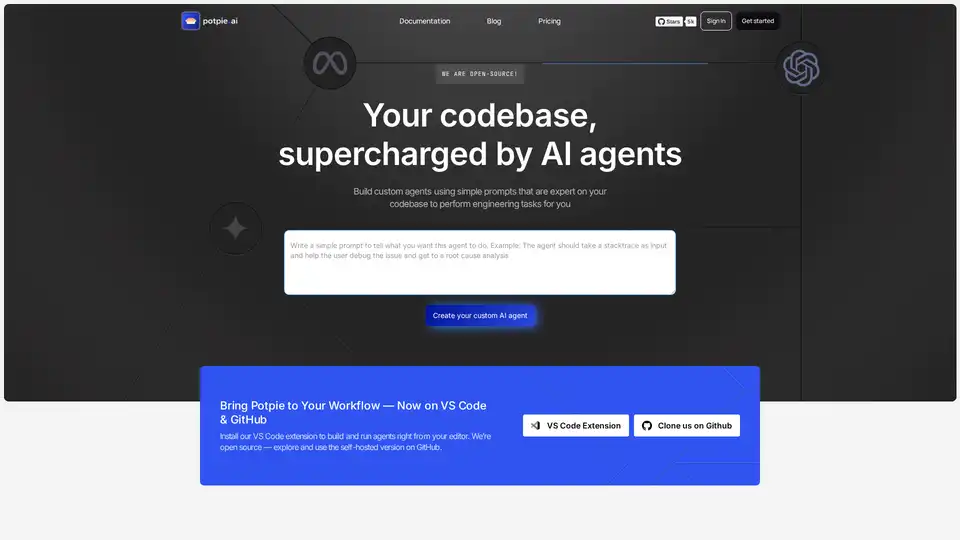
Potpie
Overview of Potpie
What is Potpie?
Potpie is an innovative open-source platform that empowers developers to create custom AI agents tailored specifically to their codebases. These agents are designed to handle complex engineering tasks with remarkable accuracy, drawing intelligence directly from your project's context and data. Unlike generic large language models (LLMs) or tools like Copilot, Potpie's agents are deeply integrated with your codebase, making them ideal for specialized use cases in software development. Whether you're a solo developer or part of a growing startup, Potpie supercharges your workflow by automating repetitive and intricate tasks.
Launched by Momenta Softwares Inc., Potpie stands out in the AI agent landscape with its emphasis on codebase awareness. It transforms your entire repository into a comprehensive knowledge graph, enabling agents to reason, plan, and act autonomously. This isn't just another coding assistant—it's a suite of intelligent, coachable agents that learn from your specific code standards and patterns.
How Does Potpie Work?
At the core of Potpie is its ability to build agents using simple prompts, without requiring extensive coding or setup. Here's a breakdown of its working principle:
Knowledge Graph Construction: Potpie scans your codebase and constructs a Neo4j-based knowledge graph. This graph captures relationships between code elements, dependencies, and documentation, serving as the foundational context for all agents. For instance, when debugging an issue, the agent traverses this graph to pinpoint root causes based on error messages.
Agentic Architecture: Powered by frameworks like CrewAI and retrieval-augmented generation (RAG), Potpie agents are autonomous entities. You provide a goal—such as "generate a low-level design for a new feature"—and the agent selects from a toolkit of functions to achieve it. These tools include code analysis, testing generation, and integration checks, all executed with context-driven precision.
Multi-LLM Support: Potpie now integrates multiple LLMs, including OpenAI, Gemini, Claude, and others. This flexibility allows you to choose models based on cost, performance, or specific needs, optimizing your agents for diverse scenarios. Configuration is straightforward via the dashboard or API, ensuring seamless switching without disrupting workflows.
Integration and Execution: Agents run in familiar environments like VS Code (via a dedicated extension), GitHub, Slack, or through APIs. The VS Code extension, for example, lets you build and deploy agents directly from your editor, while Slack integration delivers results in team chats for collaborative debugging.
This architecture ensures agents are not only intelligent but also coachable—you can fine-tune them on specific skills, like adhering to your team's coding conventions, to boost their effectiveness over time.
Key Features of Potpie
Potpie packs a punch with features that address real-world developer pain points. Let's explore the main ones:
Ready-to-Use Agents
Jumpstart your productivity with pre-built agents for common tasks:
- System Design Agent: Generates context-aware low-level designs (LLDs) that align with your codebase standards, reducing time to first commit.
- Root Cause Analysis Agent: Analyzes error messages by navigating the knowledge graph to isolate bugs quickly.
- Blast Radius Detection Agent: Assesses the downstream impacts of code changes, helping you test or mitigate risks proactively before deployment.
- Onboarding Agent: Assists new team members by explaining project setup, feature architectures, or end-to-end workflows using natural language queries.
- Unit and Integration Testing Agent: Creates comprehensive test plans and code, covering edge cases, happy paths, and full flows to ensure robust coverage.
These agents are plug-and-play, requiring minimal customization to fit your needs.
Custom Agents and Agentic Workflows
For more tailored solutions, build custom agents via simple chat interfaces or prompts. Potpie supports agentic workflows, where multiple agents collaborate on complex tasks—like a debugging agent handing off to a testing agent for validation. This seamless orchestration streamlines software development, turning tedious processes into efficient, automated pipelines.
Open-Source and Self-Hosted Options
Potpie is fully open-source, available on GitHub for cloning and self-hosting at no cost. This transparency allows developers to inspect, modify, and extend the codebase. For those preferring managed services, the hosted version starts at $20/month, offering scalability, support, and easy integrations without infrastructure hassles.
Effortless Workflow Integration
- VS Code Extension: Build, run, and manage agents from your IDE.
- GitHub Integration: Embed agents into CI/CD pipelines for automated reviews.
- Slack and API Access: Trigger agents conversationally or programmatically for team-wide use.
These integrations make Potpie a natural fit for modern dev environments, enhancing collaboration without disrupting existing tools.
Use Cases and Practical Value
Potpie shines in scenarios where codebase-specific intelligence is crucial. Consider these real-world applications:
Debugging and Error Resolution: Instead of sifting through logs manually, input an error message, and the agent traces it through the knowledge graph, suggesting fixes with code snippets. This cuts debugging time by hours, especially in large monorepos.
Testing Automation: For integration-heavy projects, generate test suites that respect your architecture. Developers report faster release cycles and fewer post-deployment bugs.
Onboarding and Knowledge Transfer: New hires can query the agent for "How is authentication implemented?" receiving diagram-free explanations grounded in your code—perfect for remote teams or high-turnover startups.
System Design and Refactoring: Accelerate planning by auto-generating designs that comply with your style guides, or detect potential breakage from refactors.
The practical value is clear: Potpie reduces engineering overhead, minimizes errors, and scales with your team. Startups benefit from its affordability and flexibility, while enterprises appreciate the security of self-hosting. User testimonials highlight its precision—far surpassing vanilla LLMs—leading to 30-50% time savings on routine tasks.
Who is Potpie For?
Potpie is versatile, suiting a broad audience:
- Individual Developers and Freelancers: Use open-source version for personal projects to automate testing or design.
- Startups and Small Teams: Affordable hosted plans for collaborative workflows, ideal for any industry from fintech to e-commerce.
- Enterprise Engineers: Leverage multi-LLM support and API for large-scale automation in regulated environments.
- AI Enthusiasts and Open-Source Contributors: Dive into the GitHub repo to build upon or extend agents for niche needs.
It's particularly valuable for teams dealing with legacy codebases or rapid iterations, where context matters most.
How to Use Potpie: Getting Started
Getting up and running is straightforward:
- Install the VS Code Extension: Search for Potpie in the marketplace and install it to access agents from your editor.
- Clone from GitHub: For self-hosting, fork the repo and set up the Neo4j database—detailed docs guide you through.
- Build Your First Agent: Use the dashboard or chat interface to prompt: "Create a debugging agent for my repo." Provide your codebase, and watch it generate.
- Integrate and Test: Connect to Slack or API, then test on a sample task like root cause analysis.
- Scale with Multi-LLMs: Configure preferred models in settings for optimized performance.
The documentation and Discord community offer robust support, including tutorials and troubleshooting. For hosted users, sign up at potpie.ai and start with a free trial.
Why Choose Potpie?
In a crowded field of AI tools, Potpie differentiates with its codebase-centric approach. It's not just generative—it's analytical and proactive. Open-source roots ensure trust and customization, while features like blast radius detection add layers of safety rarely found elsewhere. Pricing is transparent: free OSS for basics, $20/month hosted for pro features. Security-wise, self-hosting keeps data in-house, and the platform adheres to standard privacy practices.
If you're tired of generic AI outputs that ignore your code's nuances, Potpie delivers context-aware intelligence that feels like having an expert teammate. Join the community on Discord to share builds or get tips—it's a hub for AI-driven dev innovation.
Frequently Asked Questions
What Makes Potpie Agents More Accurate Than Standard LLMs?
Potpie agents inherit deep context from your knowledge graph, avoiding hallucinations common in vanilla models. They're trained on your specific codebase for engineering precision.
Is Potpie Suitable for Non-Technical Teams?
While developer-focused, its chat interfaces and Slack integrations make it accessible for product managers querying designs or onboarding info.
How Secure is Potpie?
Open-source allows full audit; hosted plans comply with data protection standards. No external data sharing without consent.
Can I Use Potpie for Non-Engineering Tasks?
Primarily for dev workflows, but extensible agents could adapt to documentation or simple automation.
Potpie isn't just a tool—it's a gateway to agentic software development, where AI handles the heavy lifting so you focus on innovation. Explore it today and transform your codebase into a smart, responsive ecosystem.
Best Alternative Tools to "Potpie"
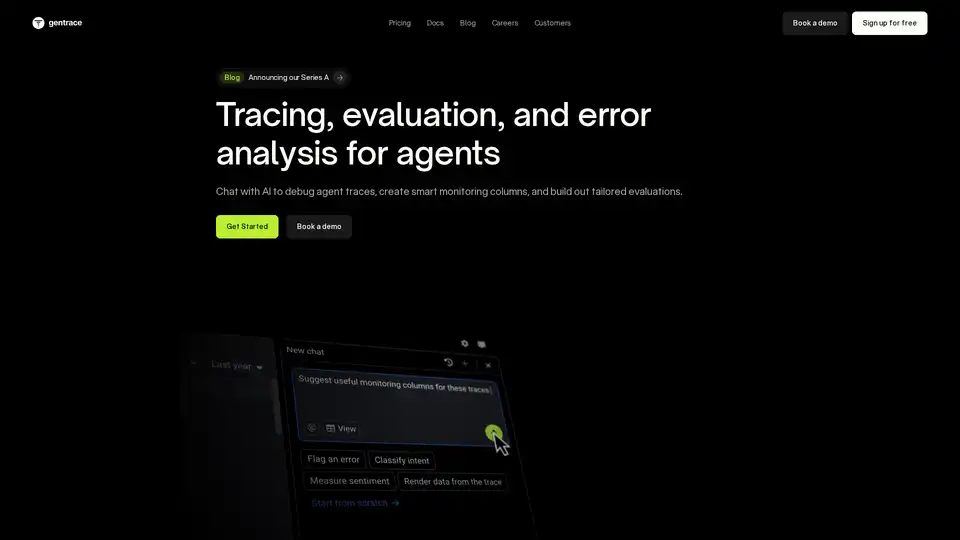
Gentrace helps trace, evaluate, and analyze errors for AI agents. Chat with AI to debug traces, automate evaluations, and fine-tune LLM products for reliable performance. Start free today!
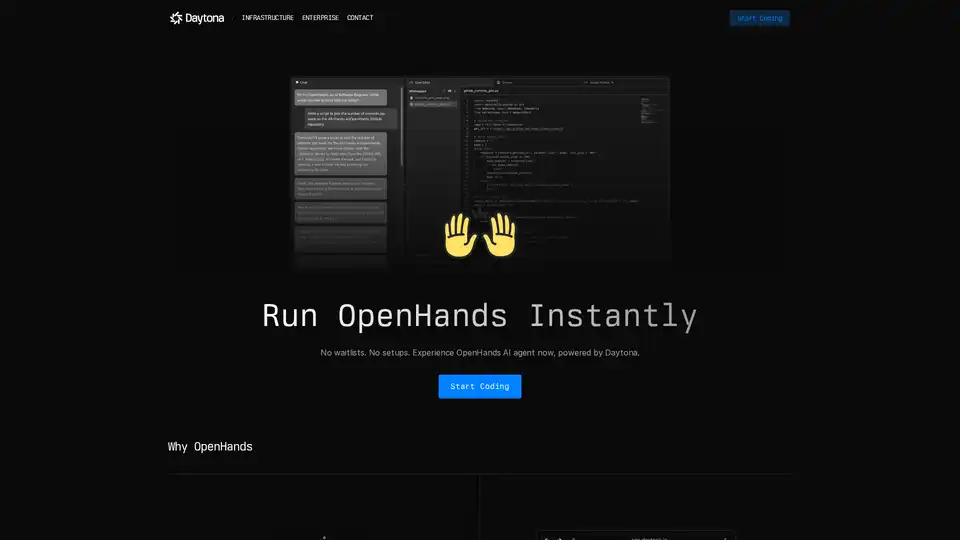
OpenHands is an AI Coding Agent powered by Daytona, designed to handle tasks like code refactoring and troubleshooting. It features natural language collaboration, parallel work capability, and adapts to enterprise needs.

Junie is an AI coding agent by JetBrains that enhances coding productivity. It helps developers by collecting context, writing code, and running tests. Designed for developers, teams, and businesses.
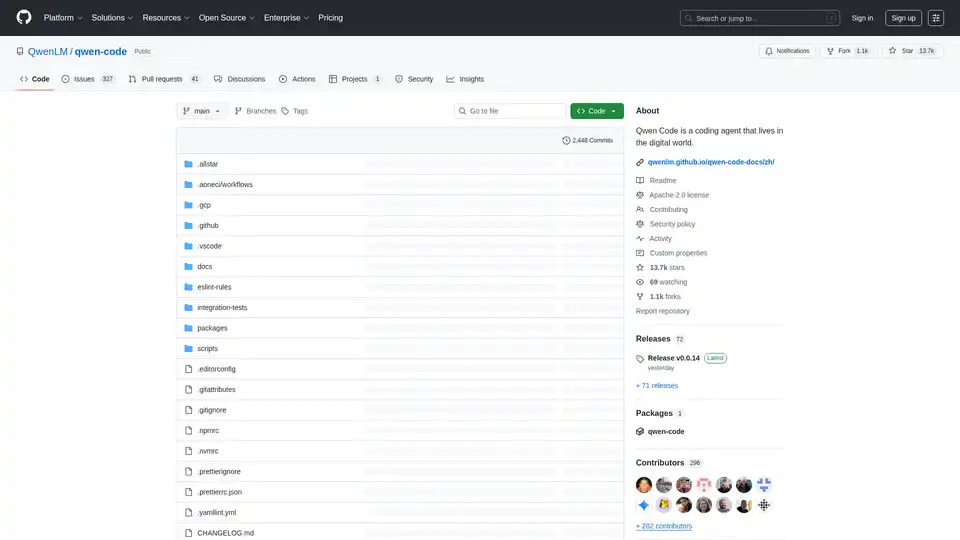
Qwen Code is an AI-powered command-line tool designed to enhance developer coding workflows with code understanding, task automation and intelligent assistance. Optimized for Qwen3-Coder models.
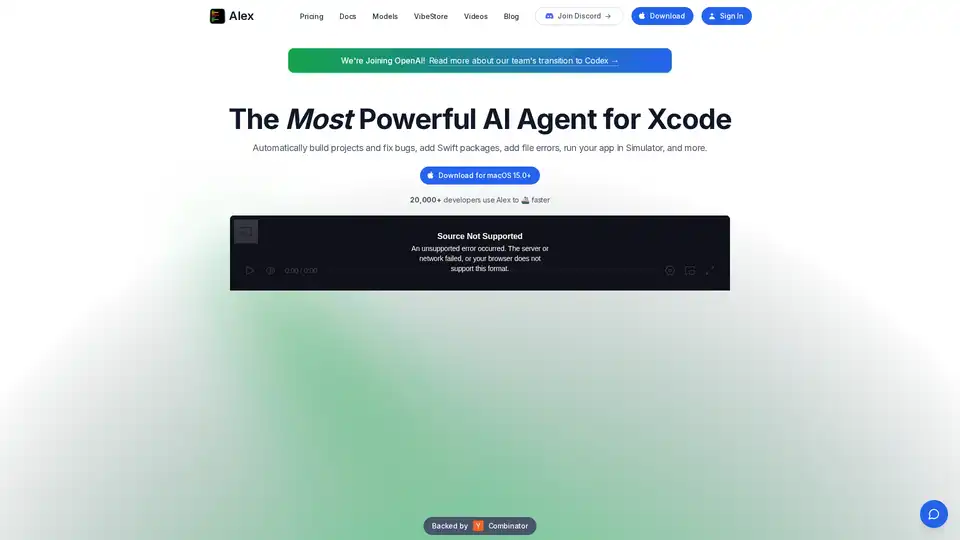
Alex is the ultimate tool for iOS and Swift app development, empowering developers with AI for Xcode to streamline workflows, tackle complex coding challenges, and boost productivity. Discover what makes it an essential asset for modern app creation.
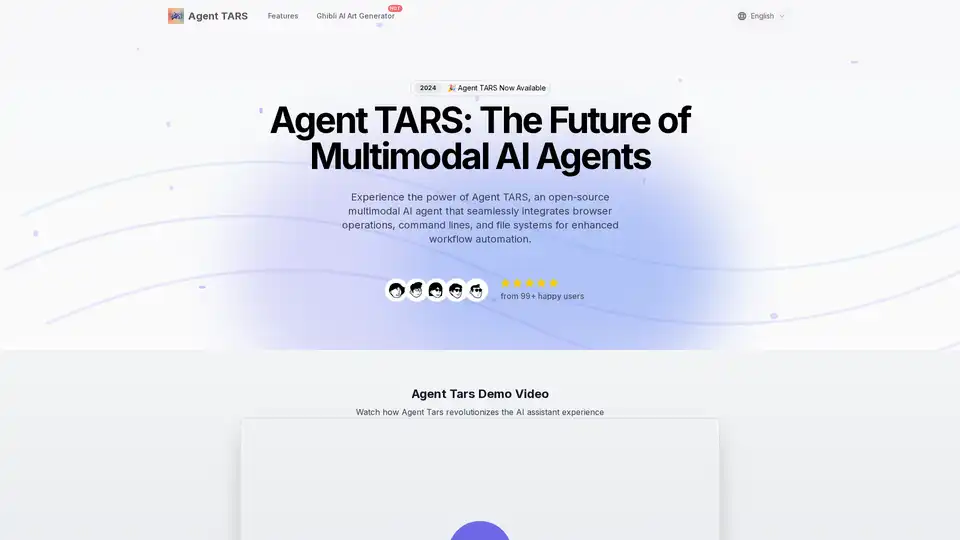
Agent TARS is an open-source multimodal AI agent that seamlessly integrates browser operations, command lines, and file systems for enhanced workflow automation. Experience advanced visual interpretation and sophisticated reasoning for efficient task handling.
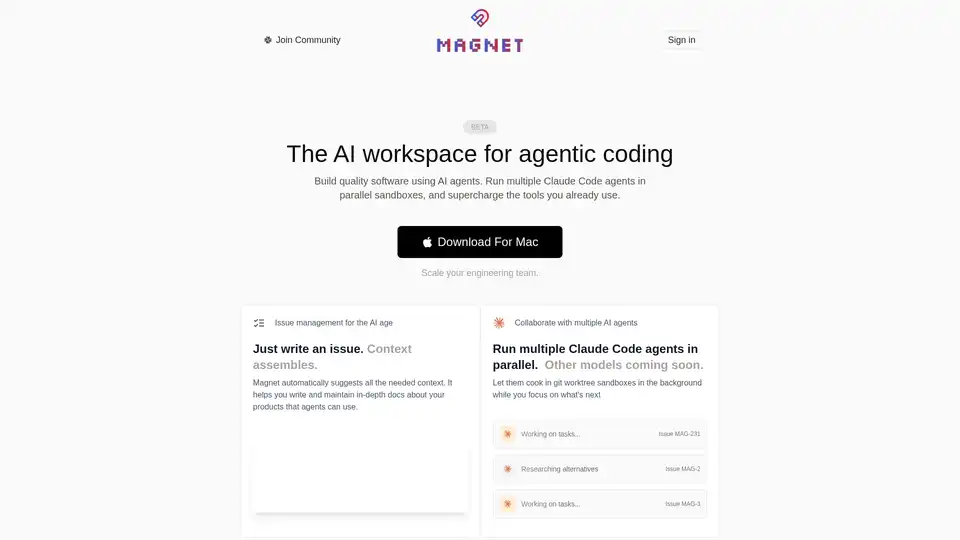
Magnet is an AI-native workspace that revolutionizes software building with Claude Code agents. Run multiple agents in parallel sandboxes, automate issue management, and scale engineering teams efficiently.
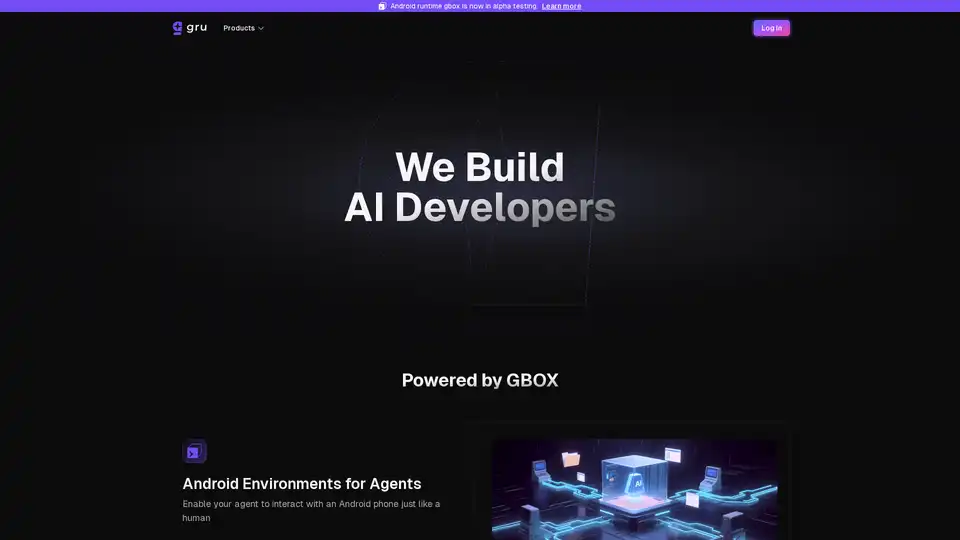
Gru.ai is an advanced AI developer tool for coding, testing, and debugging. It offers features like unit test generation, Android environments for agents, and an open-source sandbox called gbox to boost software development efficiency.
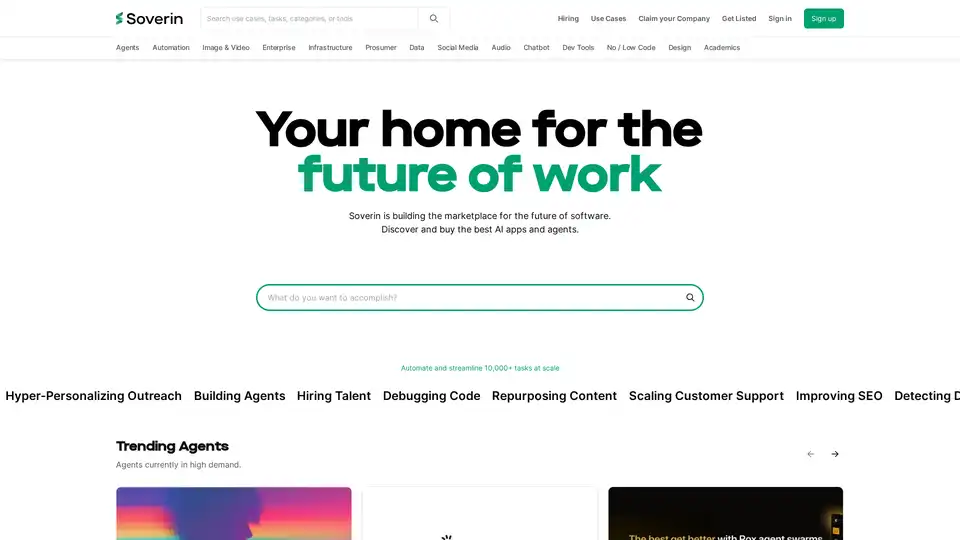
Soverin is the ultimate AI marketplace for discovering, buying, and leveraging top AI apps and agents. Automate over 10,000 tasks, from building agents to scaling customer support, and boost productivity with trending automation tools.
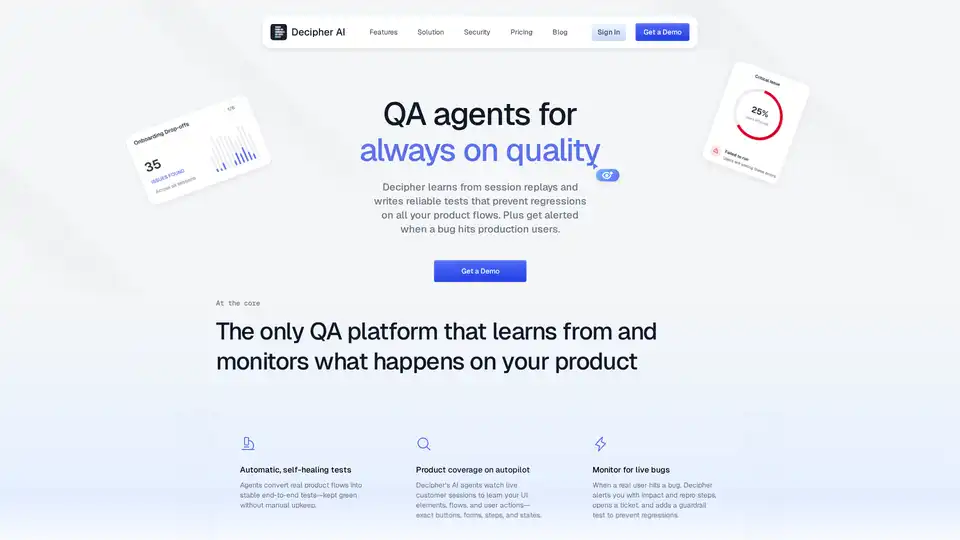
Decipher's agents learn from session replays, auto-write regression tests across every flow, and monitor production for user-impacting bugs.
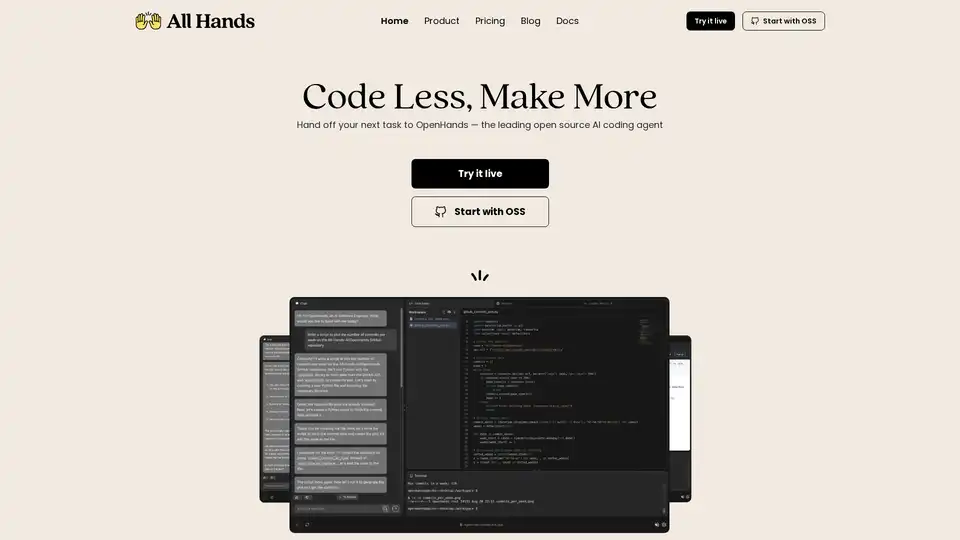
Discover OpenHands, the leading open source AI coding agent that automates code reviews, refactoring, testing, and more to boost developer productivity and reduce toil.
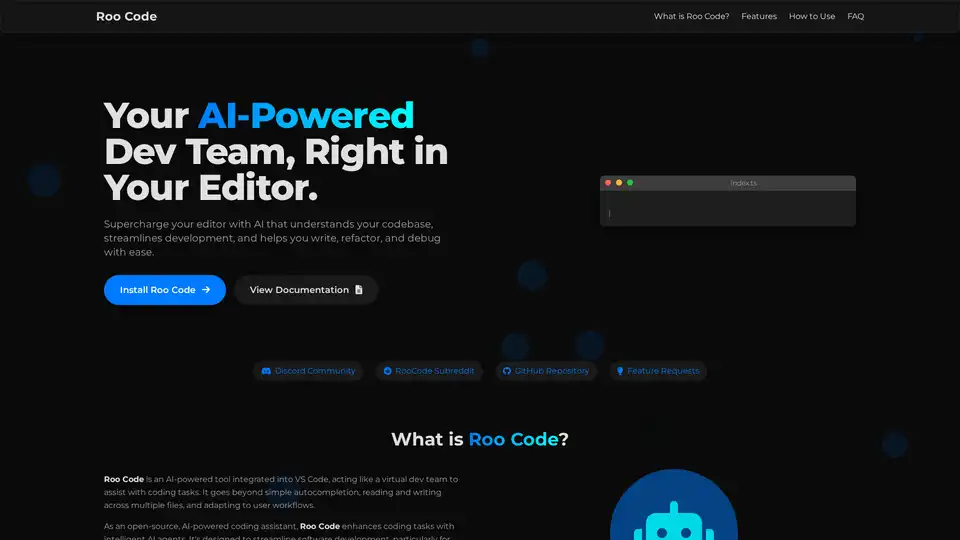
Roo Code is an open-source AI-powered coding assistant for VS Code, featuring AI agents for multi-file editing, debugging, and architecture. It supports various models, ensures privacy, and customizes to your workflow for efficient development.
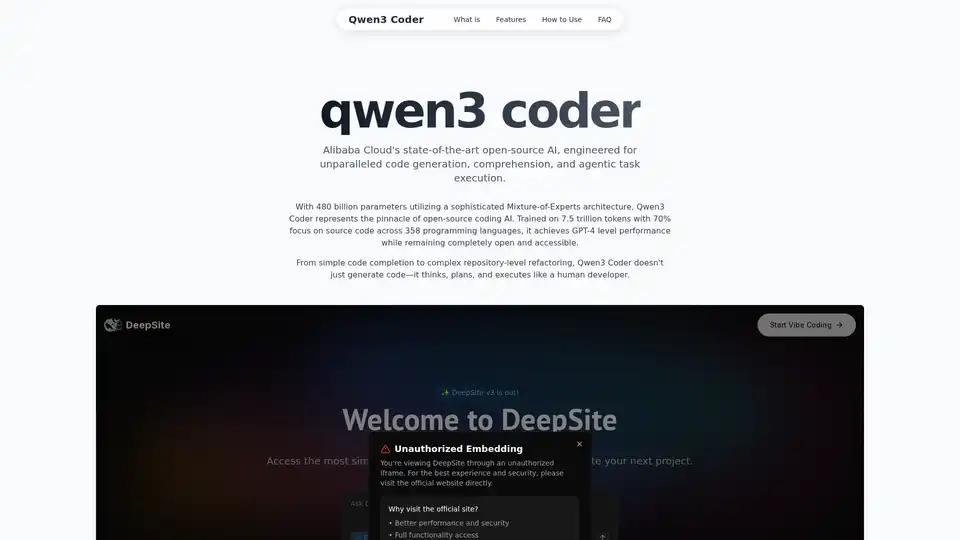
Explore Qwen3 Coder, Alibaba Cloud's advanced AI code generation model. Learn about its features, performance benchmarks, and how to use this powerful, open-source tool for development.
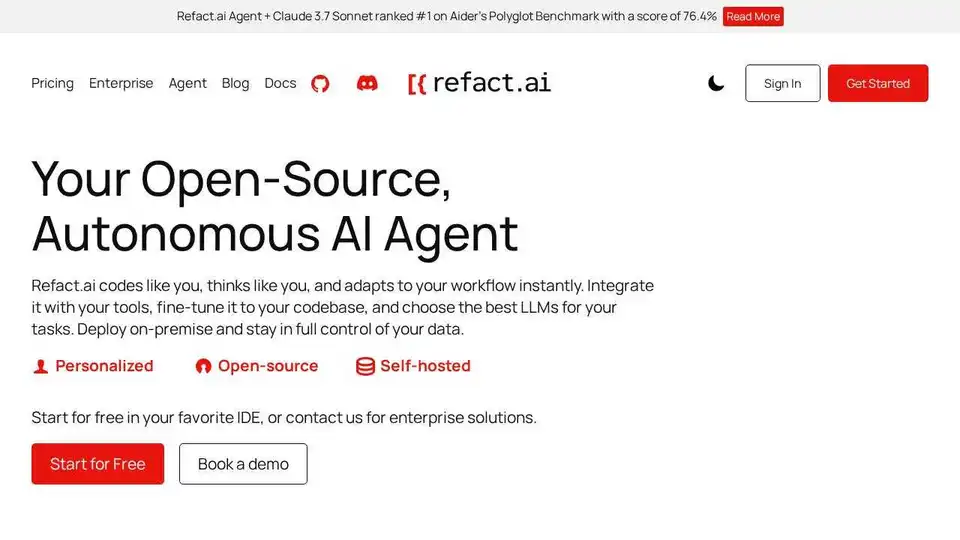
Refact.ai, the #1 open-source AI agent for software development, automates coding, debugging, and testing with full context awareness. An open-source alternative to Cursor and Copilot.
